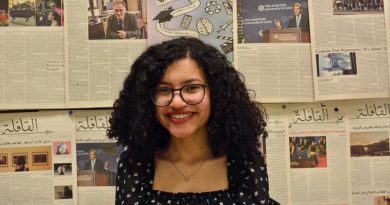Deconstructing the Modernist Approach to Literature
BY KHELOUD BADR
Follow @luluweary
English and Comparative Literature Professor William Melaney says AUCians should not be afraid of writing.
Instead, they should question how works of art come into being, and apply the concept of practice makes perfect.
A modernist, he questions what tools are used in constructing works of literature.
“The modernist is asking questions about his or her art which in fact goes beyond the conventions that were established in the past … and the modernist does break with such conventions and provides something new,” he said at a recent lecture highlighting his latest book of poetry Reconsidering the Avant-Gardes: A Short Talk on Bildungsroman.
Melaney says his book focuses on the formation of poems and how a specific format can affect the quality of the poem itself.
He explained modernism as “the phase in cultural history when artists and writers become self conscious of their materials.”
In literature, modernism is defined as breaking with the existing traditional paradigms of writing and literary discourse.
“For instance, if you are a modernist in painting, you question the way in which the image was used … If you are a modernist in literature you ask questions the role of language in constructing a novel, a poem, or a play,” he told The Caravan.
He emphasized the role of images in poetry, as he himself uses imagery quite frequently in his own writings.
He also added that one should analyze written work with a modernist approach.
Melaney has previously published two books and a short poetry book. His books mainly deal with the concept of modernity and its elements, such as formation and imagery, and how they affect literature as well as authors and poets.
Writing for as long as he remembers, Melaney’s passion was a result of various authors he read at a young age, whom he viewed as figures who shared lives, situations and feelings similar to his.
Melaney says writing gives one tools for clarifying any confusion they may face and can be used as a manner by which one resolves any difficulties or conflicts.
It can also be a personal journey, rather than just simply writing for readers, that also allows one to explore — and at times affirm – their own thoughts and feelings about various aspects of life.
The process is usually known to be tedious, where one often find themselves lost or confused, facing what is commonly known as “writer’s block.” Melaney, however, believes that could be a good thing.
“It is sort of when you are not sure about yourself when you write. It is not so much that you are writing to confirm a self. While you write, the self sort of gets lost, and then to some degree the self is rediscovered as different,” he told The Caravan.
He advises students who fear writing to just give it a try as he believes practice to be the main pillar of becoming a successful writer. He himself looks back at his past work and is surprised by how much he’s developed.
“I look back at my old poems and cringe. But I did them and worked on them, I learned from it … You shouldn’t be afraid of critique.”




